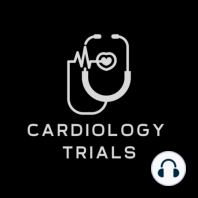10 min listen
Review of the GISSI-1 Trial
ratings:
Length:
8 minutes
Released:
Jan 8, 2024
Format:
Podcast episode
Description
Lancet 1986;397-401Background This study by the Italian Group for the Study of Streptokinase in Myocardial Infarction (GISSI) is the first large trial to test the hypothesis that opening blocked heart arteries, in this case via use of the intravenous thrombolytic agent Streptokinase, reduces death in patients presenting with acute myocardial infarction (MI). Opening blocked arteries or revascularization is now a foundational element of cardiovascular medicine that arguably spurred much of the growth in the field over the 1990’s and early 2000’s. Therefore, it is critical to revisit this historic trial and appreciate the lessons it taught us.Patients Patients were eligible who presented with chest pain and ST segment elevations of ≥1 mm in any limb lead of the electrocardiogram and/or ≥2 mm in any precordial leads and were admitted to the cardiac intensive care unit (CCU) within 12 hours from the onset of symptoms. Absolute contraindications included recent or current bleeding, stroke within the previous 2 months, a surgical procedure or trauma within the previous 10 days, invasive procedures within the previous 10 days, SBP ≥200 mmHg, DBP ≥110 mmHg, previous treatment with streptokinase, or any other life-threatening condition.Baseline characteristics The number of patients who were admitted to CCUs with acute MIs over the study period was 31,826 and 11,806 (37%) were ultimately enrolled. Reasons for exclusion included being more than 12 hr from onset of symptoms (51%), contraindications to Streptokinase (21%), unlikely to have acute MI (19%), administrative reasons (8%) and 2% were not reported. Notably, women were more likely to be excluded (27% of excluded vs 20% of enrolled) as were patients >75 years of age (21% of excluded vs 11% of enrolled).Not a lot of demographic information is provided on the cohort in the main manuscript but it was composed primarily of men (80%) who were ≤65 years of age (65%). Only a small percentage of patients were unstable, as evidenced by SBP ≤90 mmHg (<5%) or Killip scores ≥3 (<6%). More than half of patients presented within 3 hours of symptom onset and >80% within 6 hours. The main sites of infarct were anterior (36%) and inferior (34%).Procedures Immediately following randomization patients received 1.5 MU of Streptokinase infused over 1 hour if they were assigned to the treatment group. Those assigned to control received no placebo. Treating physicians and patients, therefore, were not blinded. Subsequent treatment decisions were left to the medical teams and they were encouraged to follow local policies and practices without prejudice to whether Streptokinase was given or not and this included the use of anticoagulation as there was no universal policy on whether anticoagulation should or should not be given with thrombolysis.Endpoints The primary endpoint was in-hospital all-cause mortality.Results 11,806 patients were randomized from 167 CCU’s in Italy. Streptokinase significantly reduced mortality by 18% (10.7% vs 13.0%; p=0.0002) corresponding to an NNT of 44 individuals to prevent 1 death. Cardiovascular deaths accounted for 93% of all deaths during the study period.The only subgroup analysis explicitly prespecified was stratification based on time elapsed from the onset of symptoms (0-3, >3-6, >6-9, and >9-12), and here, treatment effect heterogeneity was strongly suggested: statistically significant reductions in death were noted only for those patients presenting ≤3 hr from symptom onset and those presenting >3-6 hr from symptom onset. Overall death rates increased as time from onset of symptoms increased; however, the largest benefit was seen in those presenting ≤3 hr from symptom onset (9.2% vs 12.0% with an NNT of 36). Those presenting >9-12 hr from symptom onset experienced the highest rate of death and also may have been harmed by the intervention (15.8% vs 13.6% with an NNH of 46) but these results did not reach statistical significance, which was likely due to this group
Released:
Jan 8, 2024
Format:
Podcast episode
Titles in the series (41)
Review of the GISSI-2 Trial by Cardiology Trials
